Customers Want Personalized Experience
80% of consumers are more likely to buy from a brand that offers a personalized experience (Epsilon).

We build AI recommendation systems tailored to your business to deliver personalized user experience and maximize your revenue.
Join Global Technology Leaders
Recognized by
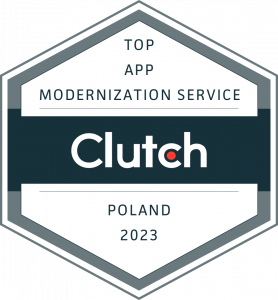
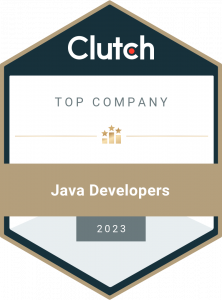


80% of consumers are more likely to buy from a brand that offers a personalized experience (Epsilon).
Personalized emails deliver 6x higher transaction rates (Experian).
44% of consumers say they are likely to return after a personalized shopping experience (Segment).
Artificial Intelligence & Machine Learning based recommender systems have become an integral part of online platforms, improving user engagement, customer satisfaction, conversion rates and overall business efficiency.
We implement recommendation engines in many industries, and we can build your own engine integrated with your systems to meet your specific business needs.
Amazon leverages AI to recommend products based on user behavior, purchase history, and browsing patterns. According to a McKinsey report, 35% of Amazon’s revenue is generated by its recommendation engine.
Introducing product recommendations is one of the most effective upsell and cross-sell methods, increasing order value with personalized item suggestions.

Netflix and Spotify use AI to suggest movies, TV shows, and music tracks tailored to individual user preferences. Netflix reports that its recommendation system saves the company $1 billion a year by reducing churn and increasing user engagement.
Boost user engagement and provide an enjoyable experience tailored to their tastes. Display the most relevant content-based recommendations based on their preferences and past behavior.
Platforms such as Coursera and Khan Academy are using AI to provide personalized course recommendations and learning materials. Personalized learning can improve student performance by up to 30%.

IBM Watson Health uses AI to analyze patient data and recommend personalized treatment plans. AI can reduce diagnostic errors by up to 85%, leading to better patient outcomes and lower healthcare costs.
Google and Facebook are using AI to serve personalized ads based on users’ interests, online behavior and demographics. According to a study by the Boston Consulting Group, personalized advertising can lead to a 20% increase in sales.
With AI for personalized ads, you can make your ads more accurate, improve your conversion rate, and increase customer satisfaction. In addition, personalized ads can lead to better targeting, higher engagement, and more efficient use of advertising budgets.

Lemonade, an insurtech company, automates the claims process and offers customized insurance plans. Brolly offers an AI-powered personal insurance concierge that helps users manage their policies, identify gaps in coverage, and recommend better deals. Root Insurance uses AI to analyze driving behavior through a mobile app, tracking metrics such as speed, braking patterns, and phone usage while driving to determine a driver’s risk profile.
Provide personalized recommendations for insurance products and services based on a customer’s history. Increase customer satisfaction, improve risk assessment accuracy, and offer tailored solutions to meet individual needs.
Robo-advisors, such as Betterment and Wealthfront, use AI algorithms to provide personalized investment advice. Betterment uses AI to provide personalized investment advice and portfolio management based on individual financial goals.
Speed up the decision-making process with AI-powered recommendations.

Uber Eats uses AI to recommend restaurants and dishes based on user preferences and previous orders. They also use machine learning for dynamic pricing and delivery route optimization.
DoorDash provides personalized restaurant recommendations and menu items. Their machine learning models predict delivery times to improve user satisfaction.
Suggest meals that match your customers’ tastes and tailor special offers based on their preferences and location. Increase conversions and revenue while improving customer satisfaction with personalized dining experiences.

Zillow uses AI to provide personalized home recommendations and price estimates through its ‘Zestimate’ tool. Redfin uses machine learning to match users with properties that meet their criteria, and provide personalized notifications.
Provide your users with personalized real estate listings and price recommendations based on data and comparisons to similar properties. Improve user satisfaction, streamline the home buying process, and increase engagement with customized real estate solutions.
Companies like Zendesk and Salesforce are using AI chatbots with personalized recommendations to provide user-centric customer support. AI chatbots can handle up to 80% of routine customer queries, reducing operational costs and improving response times.

TripAdvisor uses machine learning to recommend travel itineraries, activities, and restaurants based on user preferences, past searches and reviews. Kayak uses machine learning algorithms to recommend the best flight and hotel options by analyzing millions of data points, including pricing trends, user preferences, and travel patterns.
Hopper uses predictive analytics to recommend the best times to book flights and hotels. Hopper’s AI predicts future prices with 95% accuracy, and alerts users when to book to get the best deals. Hilton Honors uses machine learning to provide personalized recommendations for hotels and reward
Implement AI and machine learning recommendations and deliver highly personalized travel experiences to drive customer satisfaction and loyalty, while increasing conversion rates and revenue.

The developed software product was built from scratch with solid quality. We have had a long-term engagement with Stratoflow for nearly 10 years. We look at them as partners, rather than contractors. I'm impressed by their team culture and cross-team support.
Stratoflow was a great partner, challenging as well as supporting our customer projects for the best outcome. They have a great pool of talent within the business - all very capability technologists, as well as being business-savvy and suitable for consultancy engagements.
The bespoke metal exchange platform works great, it is easily accessible and richly functional. Stratoflow managed deadlines capably, meticulously documented their progress, and delivered a complex project at an affordable cost.
Provide each user with tailored suggestions that meet their individual preferences and needs, enhancing their overall experience.
Use smart algorithms to improve conversion rates and boost sales by delivering highly relevant recommendations.
Keep users engaged and satisfied with unique and personalized suggestions that resonate with their interests.
Leverage unique user data to deliver an innovative and seamless user experience.
Empower your business with data-driven insights for better decision-making using AI.
Benefit from high-performance, scalable, and customizable recommendation engines that grow with your business needs.
Ensure data privacy, security, and regulatory compliance while utilizing user data for recommendations.
Regularly review and update training data to reduce bias and ensure fair and accurate recommendations.
Use models that provide explanations or implement interpretability tools to improve understanding and trust in the recommendations.
Avoid over-personalization and provide a broader user experience by diversifying recommendations.
Enhance internal processes by using APIs and shared resources for better integration and efficiency.
Recostream, the recommendation engine built by our machine learning and AI experts, was acquired by GetResponse in 2022.
Recostream’s recommendations increase sales by 5-10% for ecommerce stores.
The recommendation engine can be integrated into a website within 3 minutes without involving a developer.
Stores using Recostream have seen a 25% increase in the share of recommended products in overall sale
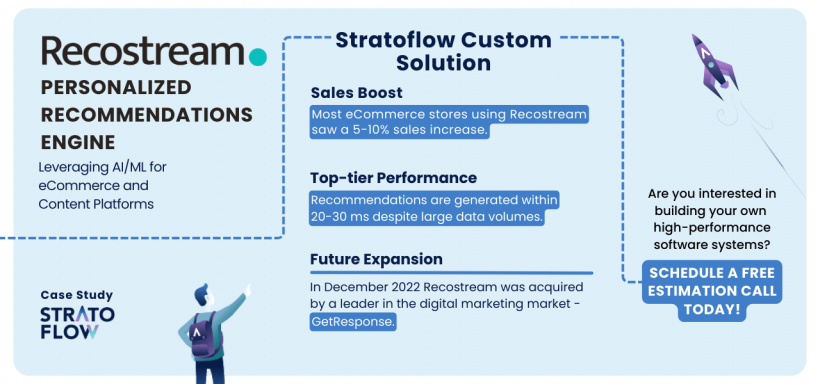
The system calculates new recommendations in 20-30 milliseconds, ensuring a smooth and responsive user experience.
Deep integration allows for accurate tracking of recommendation performance alongside other key metrics.
Improved recommendations help recover abandoned carts and improve overall customer satisfaction and retention.
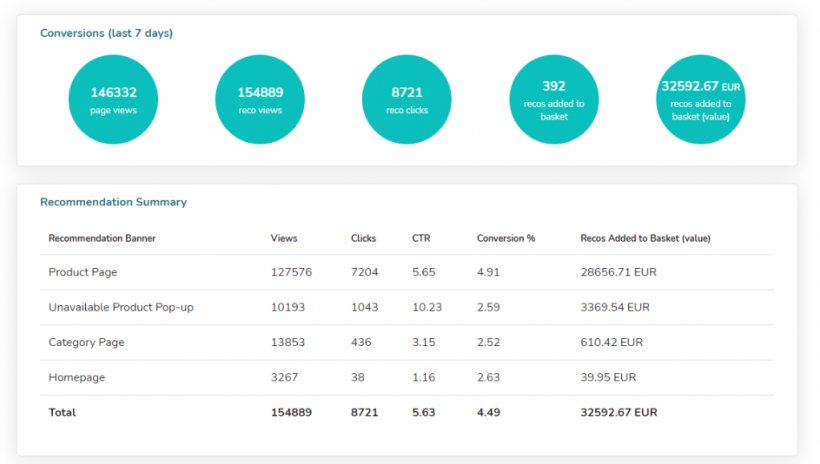
Amazon: 35% of revenue from recommendations (McKinsey & Company)
eBay: 6% increase in sales conversion rates (eBay case studies)
Netflix: $1 billion annual savings from reduced churn and improved user engagement (Netflix Tech Blog)
Spotify: 30% increase in user engagement from personalized playlists like Discover Weekly (Spotify Research)
Google Ads: Up to 50% increase in click-through rates for personalized ad campaigns (Google Ads case studies)
Facebook: 20% higher conversion rate for personalized ads (Facebook Business Insights)
Robo-Advisors (e.g., Betterment, Wealthfront): 40% increase in user retention and satisfaction (Industry reports and case studies)
IBM Watson Health: 85% reduction in diagnostic errors (IBM Watson Health case studies)
Oscar Health: 25% reduction in emergency room visits from personalized health plans (Oscar Health reports)
Khan Academy: 30% improvement in student performance (Educational studies and Khan Academy reports)
Coursera: 20% increase in course completion rates (Coursera case studies)
Zendesk: 30% reduction in support costs from AI chatbots handling personalized inquiries (Zendesk case studies)
Salesforce: 25% boost in customer satisfaction scores from personalized interactions (Salesforce research)
Airbnb: 25% increase in booking rates from personalized recommendations (Airbnb case studies)
Booking.com: 20% increase in bookings from personalized travel recommendations (Booking.com research)

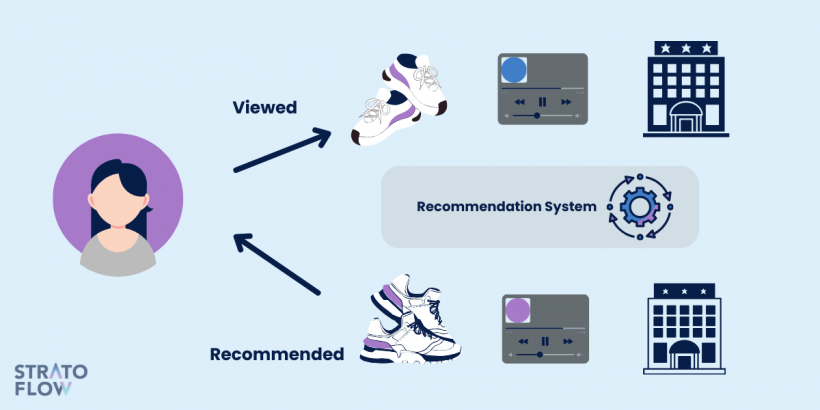
Our machine learning experts build multiple AI and machine learning models to create a scalable and real-time recommendation engine that generates the most accurate and personalized results for your users.
We collect and analyze various data points to further enhance the accuracy and personalization of these recommendations.
The resulting low-latency, highly-scalable recommendation service comes with a REST API that enables easy integration with multiple user touchpoints like mobile applications, web platforms, content generation systems, notifications, instant messages, etc.
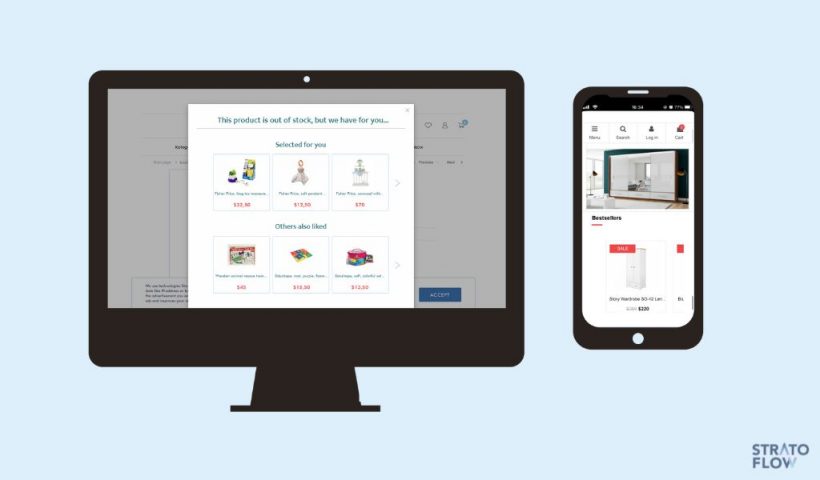
Content-based filtering recommends items similar to those a user has previously liked, based on the attributes of the items. For example, if a user enjoys a particular genre of movies, the system will suggest other movies in that genre. This model is used in movie, music and podcast platforms, as well as in media, blogs, and articles.
These are suggestions of products that the user is likely to purchase, based on their past behaviors and preferences. This method often involves understanding user profiles and product features to make accurate recommendations. Most commonly used in the ecommerce sector.
Collaborative filtering predicts a user’s interests by collecting preferences from many users. It operates on the principle that if two users have agreed on certain items, they will likely agree on others. This includes:
Hybrid recommendation systems combine multiple recommendation strategies to improve the accuracy and relevance of suggestions. This approach can leverage the strengths of both collaborative filtering and content-based methods to provide more relevant and reliable recommendations.
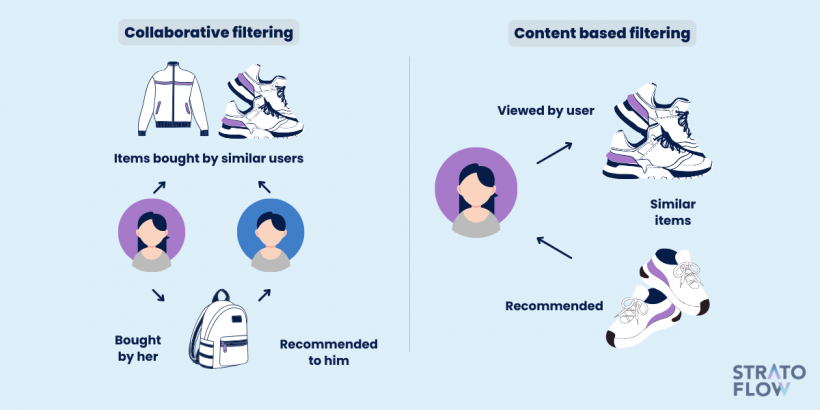

Stratoflow delivered the website successfully within the timeframe and budget. They assured that the output met the set requirements. Overall, the team's performance was excellent and recommended for their exceptional technical business expertise. They've been able to deliver all of their work on time and within budget, which has been very impressive.
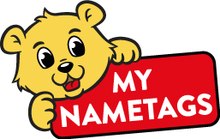
Generic recommendation engines may not fit the unique needs of every business or industry.
Sharing your customer data with recommendation engines can raise privacy concerns and potential regulatory compliance issues (e.g., GDPR, CCPA).
External recommendation solutions may struggle with scaling efficiently as the volume of users and items grows.
Recommendation engines often require historical data to make accurate suggestions. Initial recommendations for new users or items might be irrelevant or of low quality.
Issue: Many AI/ML models, particularly deep learning ones, act as black boxes, making it difficult to understand why a particular recommendation was made. Limited transparency can be troublesome for industries where understanding the decision process is critical (e.g., finance, healthcare).
Integrating third-party recommendation engines with existing systems and workflows can be complex and time-consuming.
Third-party solutions typically optimize for common metrics like click-through rates or conversions, which might not align with your business objectives.
While many third-party engines offer a quick start, they can become expensive as the usage scales.
Many third-party recommendation engines do not support real-time data processing and updates. Recommendations may become outdated quickly, especially in fast-moving industries like news or social media.

A recommendation system is an AI-driven technology that analyzes user behavior, preferences, and interactions to provide personalized suggestions. It leverages complex algorithms and data analysis to predict and present items, services, or content that align with users’ interests. Common types include collaborative filtering, content-based filtering, and hybrid methods.
Recommender as a Service (RaaS) refers to cloud-based platforms that provide recommendation engine functionality as a service. Organizations can integrate these systems into their applications to improve user engagement and personalization without having to build the recommendation engine from scratch. This model allows for rapid implementation and scalability, making it ideal for companies looking to deploy recommendation systems quickly.
On the other hand, custom machine learning recommendation engines are built specifically to meet the unique needs of an organization. They offer the advantage of complete customization, allowing companies to tailor recommendation algorithms and data handling processes to their specific needs. This can result in more accurate and relevant product recommendations, as the system can be fine-tuned based on the company’s unique user data and preferences. While potentially more resource-intensive to develop, custom solutions can provide a significant competitive advantage through highly personalized and optimized recommendations.
AI in recommendation engines involves machine learning algorithms that analyze user data to recognize patterns and relationships. Techniques such as collaborative filtering, content-based filtering, and deep learning models enable the system to generate accurate, personalized recommendations by continuously learning and adapting from user interactions and preferences.
Building a recommendation system involves several steps. Start by gathering data on user interactions, preferences, and behaviors on your eCommerce store or platform. This data is crucial for understanding what site visitors like and how they interact with different products. Identifying the most useful data points, such as user ratings, browsing history, and frequently purchased items, helps in generating accurate recommendations.
Next, design a robust database to store and manage this data. The database should handle large volumes of information and support real-time queries to provide timely product recommendations. Develop the recommendation algorithm, which can involve techniques like content-based filtering, recommending items similar to those a user has shown interest in, and collaborative filtering systems, which suggest items based on the preferences of other users with similar tastes.
Integrate the recommender tool into your application to ensure seamless data exchange and real-time updates. Continuously refine and test the algorithm to improve its accuracy and performance. A/B testing can help understand how different recommendation strategies impact user engagement and satisfaction. Iterating on the algorithm and incorporating user feedback will enhance the system’s effectiveness in delivering personalized recommendations.
Selecting the optimal recommendation engine requires consideration of several factors to ensure it aligns with your business needs and optimizes user engagement. First, determine whether an off-the-shelf solution or a bespoke recommendation engine is more appropriate. Out-of-the-box solutions are typically quicker to implement and may be more cost-effective. Conversely, custom-built solutions can be tailored to specific requirements but may require more time and resources to develop.
Pricing models for recommendation engines vary, with some charging based on the number of recommendations generated or the volume of data processed. While this model can be cost-effective for businesses with steady or low recommendation needs, it can become expensive for those with high traffic and dynamic recommendation requirements. It is crucial to understand the cost structure in order to budget effectively and avoid unexpected expenses. It is also vital to select a technology partner with expertise in developing recommendation systems and a proven track record in your industry.
Another important consideration is scalability. As your business grows, the recommendation engine should be able to handle an increasing amount of data and users. Furthermore, it is important to ensure that the system integrates seamlessly with your existing infrastructure and platforms, such as your eCommerce store or omnichannel customer engagement platform. Timely and relevant suggestions are essential for enhancing the user experience on your site.
It is important to ensure that the recommendation engine is flexible enough to adapt to changing business needs and user preferences. The system should be able to accommodate adjustments and updates without significant downtime. Finally, it is important to consider the level of support and maintenance offered by the provider. Reliable customer support can help you address any issues quickly and ensure that the recommendation system continues to perform optimally.
Learn how the Netflix algorithm uses AI to tailor content recommendations and enhance your viewing experience.
Learn how music recommendation systems predict your next favorite song and explore their impact in modern media
Boost sales with ecommerce recommendations. Learn how custom engines enhance user experience and increase order value.
Submit the form to discuss your project and our software development, team augmentation and consultancy services. Our clients are located in the US, the UK, and Western Europe.
or call us: +1 415 340 8020 (US) or +44 20 3322 8684 (UK)